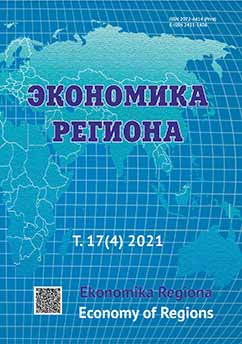Возможности и угрозы цифровизации для развития человеческого капитала на индивидуальном и региональном уровнях
Opportunities and Threats of Digitalisation for Human Capital Development at the Individual and Regional Levels
Author(s): Ilia Mikhaylovich Chernenko, Natalia Removna Kelchevskaya, Irina Sergeevna Pelymskaya, Hasan Khayoon Abbas AlmusaediSubject(s): Economy, Geography, Regional studies
Published by: Институт экономики Уральского отделения Российской академии наук
Keywords: human capital; digitalisation; opportunities and threats; labour market; professional polarisation; Russia; regions
Summary/Abstract: In the context of digital transformation of the economy, human capital development depends on differences in earnings. Previous studies examined the relationship between wage differentiation and employee competencies without considering the regional digitalisation. The present research tests a hypothesis of the dependence of wage differentiation on individual digital competencies, likelihood of job computerisation and digital development of a region. Linear regression method based on Mincer equations was utilised. The empirical basis comprises data from the Russia Longitudinal Monitoring Survey — Higher School of Economics (RLMS-HSE) and statistics of the Federal State Statistics Service on the digitalisation of Russian regions in the period from 2003 to 2018. Development opportunities and threats have been conceptually identified in terms of substitution and supplementation of labour, distribution of entrepreneurial risks, the use of digital competencies and the influence of regional digitalisation on differences in individual earnings. The revealed professional polarisation of the Russian labour market due to digitalisation creates unequal opportunities for income growth and professional development in the mid-term. In contrast to previous studies, this research analysed how the likelihood of computerisation affects wages, showing that while, in general, digitalisation creates an advantage for human capital, an increase in computerisation reduces earnings by almost a quarter. High level of digitalisation of certain regions supports human capital, yielding a wage increase of 5–10 % on average. The study results can be practically applied to support strategic decisions for the development of digitalisation at the local and regional levels. Moreover, the necessity to monitor professions under the threat of digital automation in regions is shown.
Journal: Экономика региона
- Issue Year: 17/2021
- Issue No: 4
- Page Range: 1239-1255
- Page Count: 17
- Language: Russian

